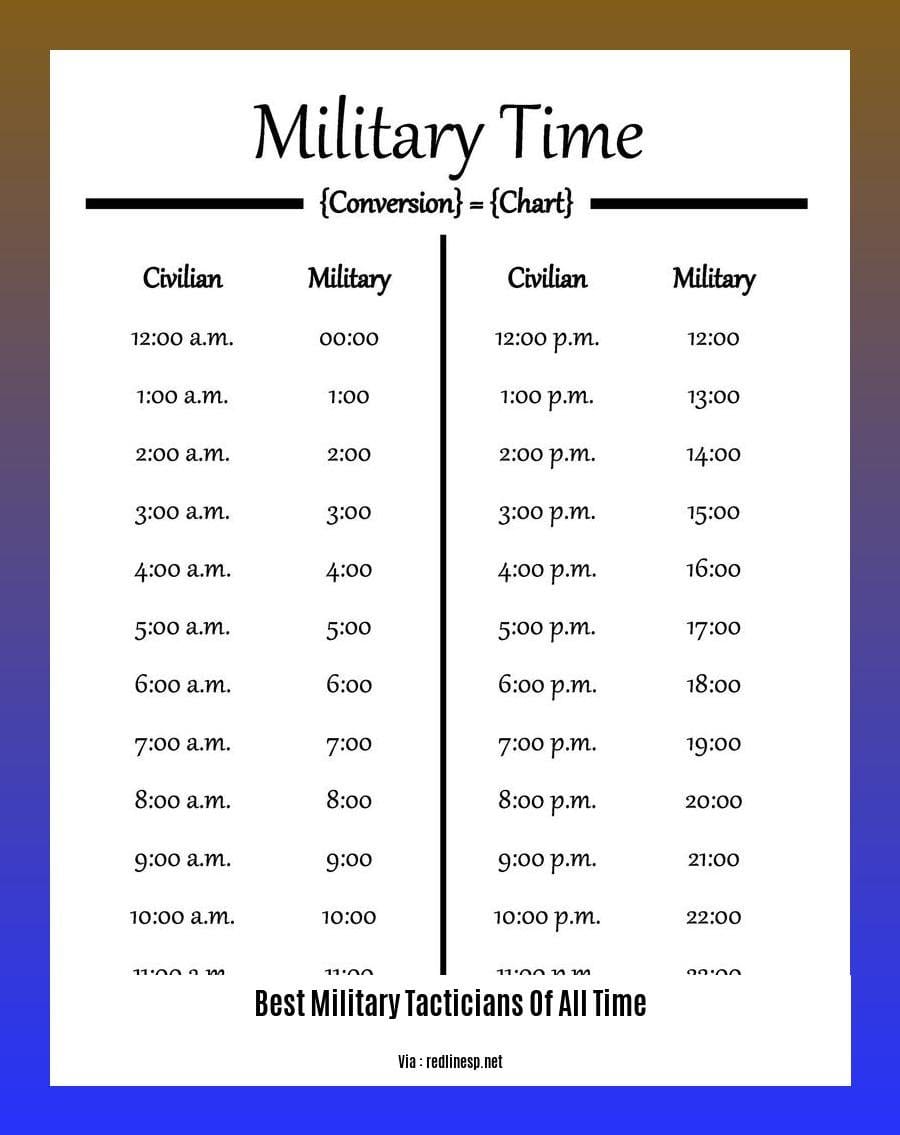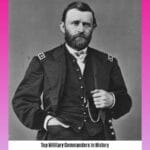Prepare to delve into the minds of history’s most formidable tacticians in “The Best Military Tacticians of All Time.” This insightful article explores the strategies and techniques that shaped the outcomes of conflicts, providing a glimpse into the brilliance that has shaped the art of warfare.
Key Takeaways:

- Hannibal Barca’s strategies and leadership skills set him apart as the greatest military strategist.
- Napoleon Bonaparte’s adaptations of existing tactics led to impressive victories.
- Alexander the Great’s leadership and military prowess resulted in the conquest of a vast empire.
- Sun Tzu’s “The Art of War” remains a highly influential work on military strategy.
- Erwin Rommel’s success in unconventional warfare tactics earned him the nickname “Desert Fox.”
Best Military Tacticians of All Time
Throughout history, brilliant minds have shaped the art of warfare with ingenious tactics and strategies. From ancient times to the modern era, these best military tacticians of all time left an indelible mark on battlefields.
Ancient Era
Alexander the Great: His bold leadership and innovative tactics, like the phalanx formation, led to the conquest of a vast empire.
Hannibal Barca: Known as the “Father of Strategy,” Hannibal’s innovative use of terrain and unconventional warfare brought victories against a superior Roman army.
Medieval and Renaissance Era
- Joan of Arc: A peasant girl who led the French army to victory against the English, Joan’s unwavering faith and inspirational leadership motivated her troops.
Early Modern Era
Ferdinand Magellan: His daring circumnavigation of the globe revolutionized naval navigation and expanded European knowledge of the world.
Horatio Nelson: Known for his bold tactics and decisive leadership, Nelson’s naval victories at Trafalgar and the Nile secured British naval supremacy.
Modern Era
Napoleon Bonaparte: A brilliant strategist and military innovator, Napoleon adapted existing tactics to achieve remarkable successes. His Grande Armee revolutionized warfare with its speed and discipline.
Erwin Rommel: Nicknamed the “Desert Fox,” Rommel excelled in unconventional warfare, using mobility and deception to outmaneuver his opponents in North Africa.
George S. Patton: An aggressive and charismatic leader, Patton’s tank tactics played a crucial role in Allied victories in World War II.
These best military tacticians of all time left a lasting legacy on warfare, their strategies and tactics still studied and applied today. Their exceptional skills, adaptability, and leadership qualities continue to inspire and guide military minds.
If you are interested in learning more about the greatest military strategists and tacticians in history, then you must read this article. The article sheds light on the most brilliant military strategists, who left a lasting impact on the art of warfare. It also highlights legendary generals known for strategy, whose tactics and leadership skills continue to be studied by military strategists today.
Early Modern Era Tacticians
Ferdinand Magellan, Horatio Nelson, and the Duke of Wellington, these military masterminds of the Early Modern Era revolutionized warfare with their strategic brilliance.
Magellan, the intrepid navigator, proved that daring could conquer the unknown. His epic circumnavigation opened new sea routes, forever altering the course of exploration and trade.
Nelson, the audacious naval commander, instilled unmatched confidence in his sailors. His bold tactics, like the audacious “Nelson Touch,” secured British naval dominance and changed the face of seafaring.
Wellington, the steadfast general, epitomized military precision and discipline. His unwavering determination and innovative tactics led to decisive victories, including the iconic Battle of Waterloo.
Key Takeaways:
- Magellan’s voyages expanded human knowledge and reshaped global trade.
- Nelson’s strategic prowess and leadership transformed naval warfare.
- Wellington’s military genius showcased the power of discipline and calculated maneuvers.
Tactics of the Modern Era Tacticians
From the battlefields of Austerlitz to the unforgiving sands of North Africa, military tacticians have left an indelible mark on the art of warfare. Napoleon Bonaparte once said, “Tactics are the application of principles.” Over centuries, these principles have evolved, shaped by the innovations and brilliance of military minds. Here are some of the most effective Tactics of the Modern Era Tacticians:
Napoleon Bonaparte: The Master of Maneuver
Napoleon’s lightning-fast campaigns and use of artillery changed the face of warfare. His ability to concentrate his forces at the point of attack, while keeping his opponents off balance, proved devastatingly effective.
Erwin Rommel: The Desert Fox
Rommel’s unconventional tactics and use of mobility in the North African desert earned him the nickname “Desert Fox.” His mastery of combined arms warfare and blitzkrieg tactics allowed him to outmaneuver and defeat numerically superior Allied forces.
George S. Patton: The Armor General
Patton’s aggressive and bold leadership style, coupled with his innovative use of armored warfare, played a pivotal role in Allied victories in World War II. His emphasis on speed, firepower, and mobility set the standard for modern tank tactics.
Key Takeaways:
- Mobility and Maneuver: Modern tacticians emphasize the importance of mobility and maneuver to gain an operational advantage.
- Combined Arms: The effective coordination of different combat elements (infantry, armor, artillery) enhances combat power.
- Air Superiority: Controlling the skies provides a significant advantage in reconnaissance, close air support, and strategic bombing.
- Technology: Technological advancements have revolutionized warfare, with the introduction of precision-guided munitions, drones, and electronic warfare.
Most Relevant URL Source:
Summary of Key Tactical Principles
Throughout history, military strategists have grappled with the art of warfare, seeking to outmaneuver and defeat their adversaries. From ancient phalanxes to modern-day aerial combat, the key principles of military tactics have shaped the outcomes of countless battles. Here’s a closer look at some of these fundamental principles:
Terrain: Mastering the terrain is critical. Hannibal Barca famously used the rugged Italian landscape to trap and defeat a larger Roman army at the Battle of Cannae.
Maneuver: Mobility and flexibility are crucial. Napoleon Bonaparte’s lightning-fast maneuvers and use of artillery revolutionized warfare during the 18th and 19th centuries.
Surprise: Catching an enemy off guard can be decisive. Alexander the Great’s rapid advances and bold cavalry charges often left his opponents stunned and overwhelmed.
Communication: Effective communication is paramount for coordinating troops and executing complex maneuvers. Julius Caesar’s innovative use of messengers and signal flares ensured the smooth operation of his legions.
Leadership: Exceptional leaders inspire and motivate their troops, fostering a sense of unity and purpose. Joan of Arc’s unwavering faith and charisma ignited the French army during the Hundred Years’ War.
Key Takeaways:
- Terrain mastery grants strategic advantages.
- Mobility and flexibility outmaneuver opponents.
- Surprise overwhelms and demoralizes enemies.
- Effective communication ensures seamless coordination.
- Inspirational leadership galvanizes troops.
*Most Relevant URL Source:
Ten Greatest Military Tacticians in History

FAQ
Q1: Who is regarded as the greatest military strategist of all time?
A1: Hannibal Barca is widely considered the greatest military strategist of all time due to his innovative tactics and leadership skills.
Q2: Which military leader revolutionized warfare during the 19th century?
A2: Napoleon Bonaparte revolutionized warfare during the 19th century with his aggressive maneuvers and innovative strategies.
Q3: Who is the Chinese philosopher and military strategist known for his treatise “The Art of War”?
A3: Sun Tzu is the Chinese philosopher and military strategist whose treatise “The Art of War” continues to influence military thought today.
Q4: Which German general was nicknamed the “Desert Fox” for his leadership in North Africa during World War II?
A4: Erwin Rommel was the German general nicknamed the “Desert Fox” for his daring tactics and leadership in North Africa during World War II.
Q5: Which Macedonian king conquered vast territories using innovative tactics such as the phalanx formation and cavalry charges?
A5: Alexander Magnus, the Macedonian king, conquered vast territories using innovative tactics such as the phalanx formation and cavalry charges.
- Crypto Quotes’ Red Flags: Avoid Costly Mistakes - June 30, 2025
- Unlock Inspirational Crypto Quotes: Future Predictions - June 30, 2025
- Famous Bitcoin Quotes: A Deep Dive into Crypto’s History - June 30, 2025
















